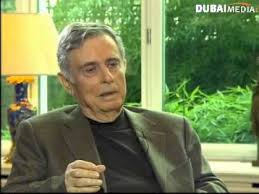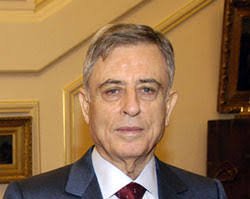He emphasized that Alawites support his downfall, but they fear his oppressive actions.
Khaddam, in an interview with “Al-Seyassah,” stated that Bashar has no choice but to escape or face a fate similar to that of Gaddafi. He described Assad as a conspirator against Alawites, aided by Washington and Paris. While Hafez al-Assad used to prioritize his own worship and exploit his sect to safeguard his authority, he was comparatively more reasonable than his son.
Former Syrian Vice President Abdel Halim Khaddam stressed that President Bashar Al-Assad will not remain in power, asserting that he has two options: either flee or be overthrown by the rebels, similar to what transpired with the late Libyan leader Muammar Gaddafi.
Khaddam revealed in the interview with “Al-Seyassah” that a majority of Alawites support the fall of the regime but are hesitant to join the revolution due to fear of reprisals. He stated, “Alawites in Syria are gripped by fear and terror from Bashar’s oppressive actions and the potential revenge of the revolution. Alawites desire Bashar’s downfall, yet they have not publicly announced it out of fear of his violent response.” He also highlighted that within Syria, it is widely known that if a Sunni and an Alawite write similar newspaper articles criticizing the regime, the punishment for the Alawite would be more severe, as the regime expects unwavering loyalty from them. However, Khaddam mentioned that he is currently in contact with many generous members of the Alawite community, encouraging them to overcome their fears and participate openly in breaking the barrier of fear.
Khaddam expressed that the late President Hafez al-Assad was comparatively “more reasonable” than his son Bashar. He added, “Hafez al-Assad used to worship himself and employed tactics to protect his regime within the Alawite community. Approximately 90 percent of military college students belong to the Alawite community, selected by senior officers who are affiliated with specific tribes. Each officer provides a list of their clan members.”
He criticized the Syrian regime’s harsh condemnation of Arab League Secretary-General Nabil El-Araby, stating that El-Araby does not hold decision-making power but serves as the Secretary-General who announces the final decisions made unanimously by League members.
Khaddam questioned the Syrian regime’s appeal for an emergency Arab summit, given their claim that all ministers who participated in the decision to suspend Syria’s membership in the Arab League are American agents. He asked, “If the Syrian regime believes that these ministers represent states that are being called upon to hold a summit, then why are they labeled as agents of America?”
He emphasized that Assad is among the most prominent individuals who missed significant opportunities since assuming power after his father’s death. Khaddam claimed that Bashar al-Assad squandered a golden opportunity to reform an inherited system plagued by corruption and poverty among the Syrian people.
Furthermore, Khaddam added that Bashar al-Assad’s tenure will not endure, and his fate will be either to flee or to be ousted by rebels in the streets, similar to Gaddafi’s fate. He argued that the current Syrian regime has created a dangerous and bitter sectarian divide in Syria, with Sunnis constituting 90 percent of the population while Alawites account for only 5 or 6 percent. He questioned how this small portion, which does not represent a majority or a significant minority, can maintain control over the reins of power.
Regarding his knowledge of the Damascus regime’s involvement in the assassination of former Lebanese Prime Minister Rafik Hariri, Khaddam revealed that during one of the leadership meetings, Bashar stated that they were facing an American-French attack with the assistance of Rafik Hariri, who was mobilizing his sect (Sunnis) against them (Alawites). Recognizing the significance of Bashar’s words, Khaddam called him after the meeting and warned him about the potential danger if such statements were leaked. He immediately informed Hariri through former Lebanese Minister Mohsen Dalloul, urging him to leave Lebanon and publicly announce his resignation at the airport. However, Hariri did not act upon the advice. A week before his assassination, Khaddam had lunch with Hariri and questioned why he hadn’t heeded the advice. Hariri responded that Maher Al-Assad had sent a message of friendship and reassurance through Awni Al-Kaki. Khaddam regarded it as merely a gesture of reassurance.
Khaddam asserted that former Syrian Minister of Interior Ghazi Kanaan was an honorable officer who hailed from a well-off family and did not need to engage in corrupt practices. He suggested that Kanaan’s death, announced as suicide by the regime, came after Assad discovered that Kanaan had provided significant information to the International Commission of Inquiry into Hariri’s assassination, condemning the regime’s involvement in the crime. Assad called Kanaan to the palace, where he faced harsh words from Assad. Kanaan left the palace and returned home, retrieved a gun, and then went to his office, where he took his own life.
Khaddam revealed the tense relationship between Assad and Kanaan, stating that when Kanaan held the interior portfolio, he would contact the secretary of the president for instructions instead of directly communicating with the president himself. He highlighted that while the Assad and Kanaan families were from the same clan, the Kanaan family held a leadership position within the clan, while the Assad family was on the periphery.
Regarding the security practices during Syria’s control over Lebanon, Khaddam acknowledged that the Syrian intelligence services carried out terrible and abhorrent actions in Lebanon during that time. However, he clarified that he and even the Chief of Staff were not fully aware of these practices because the head of the intelligence branch in Anjar reported directly to President Hafez al-Assad without going through General Ali Doba, the head of the Military Intelligence Division. Khaddam learned about some of these atrocities either through Lebanese visitors or directly from President Assad himself.
He stated that corruption originated from within Assad’s household and eventually spread as a general norm. Khaddam asserted that the primary goal of Syrian intelligence officers working in Lebanon was to accumulate wealth through any means possible.
Reflecting on the period when he was a key figure within the regime, Khaddam clarified that he was responsible for foreign policy and had no involvement in domestic affairs. He highlighted that Syrians took pride in the country’s foreign policy and desired the same level of success in internal matters. He challenged anyone to provide an example where he had offended any Syrian citizen during his time in power.
Khaddam further added, “I attended a conference of the Non-Aligned Summit and subsequently prepared a comprehensive report, which I presented to the leadership. In the report, I emphasized the necessity for Syria to embrace globalization, which entails political and economic reforms, as well as genuine people’s participation in governance. However, the very next day, my sons Jamal and Jihad became targets of a security campaign related to a fabricated charge concerning the nuclear waste file.”
Khaddam confirmed that former President Hafez Al-Assad established an investigation committee, which declared the innocence of his two sons. He emphasized their willingness to appear before any international court to prove their innocence against the false allegations orchestrated by the Syrian intelligence services. Recounting his interaction with the late president, Khaddam shared, “After the conclusion of the investigation, Hafez al-Assad called me and said, ‘Your two sons are innocent.’ I responded that I was already aware of that fact, and I know the involvement of a security official in this operation. However, I refrained from disclosing the person’s name. When asked why, I replied that I couldn’t protect him. Hafez al-Assad looked at me with admiration, and I immediately added, ‘Whenever you wish to discuss a secret and important matter, invite me to the palace to avoid any risks of surveillance during phone conversations.’


